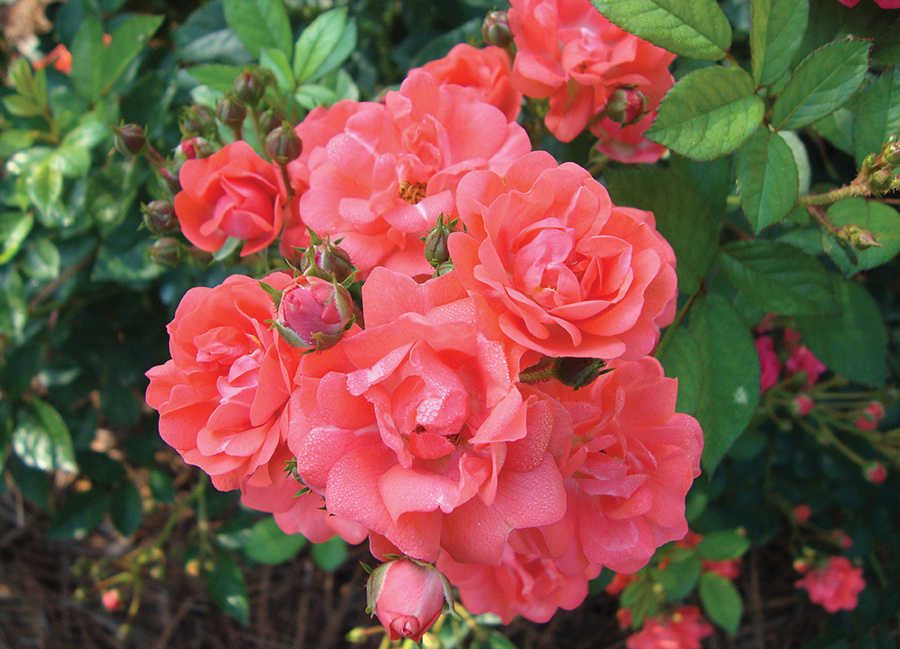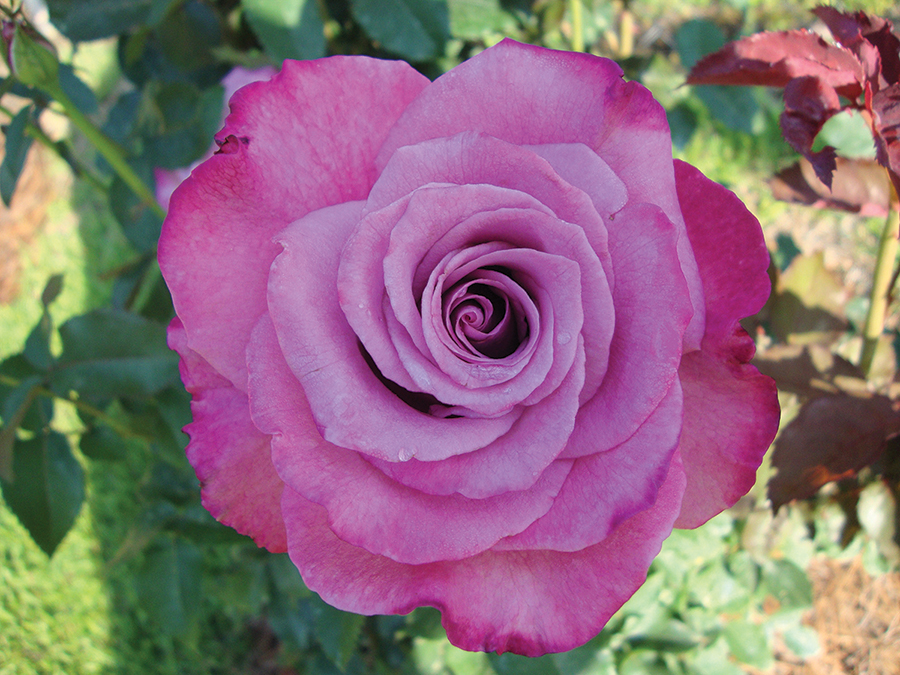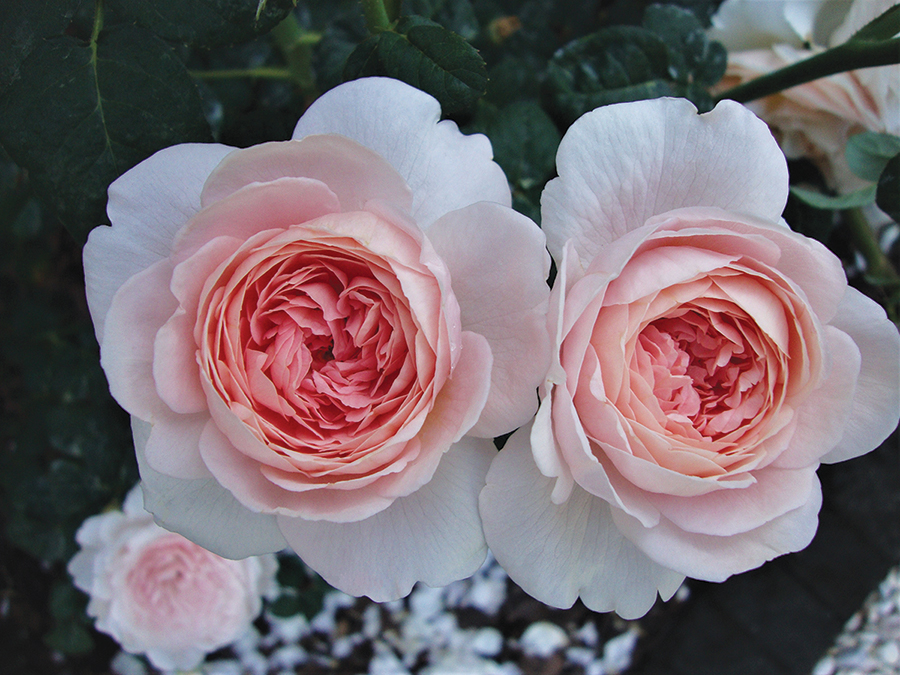Now’s the time to plan and take a plunge into the flower of love
By Anne Barnhill
Roses, the flowers of love, have permeated our culture with a sweet perfume. We look through rose-colored glasses, we speak of thorny issues, and we send roses to our loved ones for every occasion from birth to death. There’s clearly something about a rose that intrigues and delights us. The Wilmington Cape Fear Rose Society, founded in 2003, understands our love for this most symbolic bloom.
“I’ve always had roses. I spent 20 years in the Navy and then lived in D.C. We had roses there and won yard of the year,” says Bill Hartzell, president and founder of the society. “When we moved to Wilmington, all I heard was, ‘Don’t try to grow roses!’ Well, of course I took that as a challenge and wanted to prove the naysayers wrong. So, my wife and I looked for a rose society. The closest one we found was in New Bern. We joined.”
That dire warning — Don’t Try Roses Here — is ubiquitous. I heard the advice myself when I first moved to the coast. But as Denise Miller, treasurer and founding member, explains, “We have lots of humidity, which means you have to fight black spot. But you can spray. You can’t go all organic in Wilmington. I spray about every two weeks. You can grow roses here — but it takes a lot of work.”

Both Miller and Hartzell suggest keeping a calendar regarding spraying and fertilizing (another must for this area) in order to keep from doing too little or too much.
Hartzell and his wife, Patti, were happy to drive to New Bern for rose events, but eventually, that society wilted. Hartzell decided to check into the possibility of starting a rose society in Wilmington. He contacted the American Rose Society and discovered that Wilmington used to have a chapter. He got the names of former members and sent out letters to see if he could generate some interest. His wife put signs up in the local garden stores, and that’s where Miller first discovered Hartzell’s efforts. She was hooked right away.
What exactly does a rose society do? More than you might expect. In October, they host a rose exhibition here in Wilmington. It’s called an exhibition rather than a show because the society doesn’t “strictly adhere to the American Rose Society’s rules,” according to Hartzell. “We want people to show up and we want to award prizes — we even have our own judges, Bob and Linda Knerr. Before they sold their home in Virginia to come here, they had 350 rose bushes!” he says.
In addition to the exhibition, the society holds a fundraiser from November to January where they sell organic soil, rich with such things as bone meal, blood meal, fish meal called osmocote, at a bargain price. Other annual events include a Christmas brunch, a rose tour and an August picnic. The Rose Society donates a portion of its proceeds to the Ability Garden at the Arboretum, a garden designed for the disabled. They also contribute a scholarship to the Cape Fear Horticulture program.

But which kind of roses should you grow? Many roses have poetic names — Lady Banks, Moonstone, Queen of Sweden, Double Delight, The Fairy — while others are named after people — Queen Elizabeth or Mr. Lincoln. Decisions, decisions! There are so many types to choose from: “There’s the hybrid tea rose, which is a rose that has been hybridized to pick up a certain quality, bred with the tea rose. These will have a single bloom on a high stem. And there are floribunda roses, which have more than one blossom per stem. You also have climbing roses and miniatures,” says Hartzell. Other varieties include the old garden roses — roses that originated prior to 1867 — shrub roses and even tree roses.
The Wilmington Cape Fear Rose Society is always willing to help beginning rose gardeners. Members often speak to local garden clubs, and if you need more professional help, they can recommend rose experts. “Witherspoon Roses in Durham can help you get started, if you have an interest,” says Hartzell.
“For years, I avoided roses like the plague, even though my grandfather and my mother grew them,” says Miller. “I’d always heard roses were a challenge and finally, I rose to the challenge.” Now Miller is a square-foot gardener, who places six rose bushes in a 4-foot-square bed. “I have an old-fashioned rose from my grandfather,” she says. Imagine — a living inheritance.
There’s another possible hindrance to growing roses on the Carolina coast besides the humidity and heat — hurricanes. Do these storms affect sturdy roses? “Absolutely,” says Hartzell. “A hurricane can strip off leaves from a plant and can also loosen the roots. The roses aren’t as pretty this year because of Hurricane Matthew.” However, both Hartzell and Miller agree that such a fear should not deter the potential rose gardener. And the society is always looking for new members. “All ages are welcome, and we’ll help you on your way,” says Hartzell.
Besides producing beautiful flowers, there are other benefits to rose gardening. Harzell is confident that his gardening keeps him spry. Miller, a physical therapist, seconds that philosophy: “Digging in the dirt is good for the soul.”

TIPS FOR GROWING ROSES
Roses need at least six hours of sun per day.
For a normal summer, water once a week. In extremely dry weather, water three times per week.
Prepare the soil by digging three shovelfuls. Throw two away. Use the remaining dirt to mix with compost and other soil conditioners. Be sure there is lots of organic stuff in the soil.
Be sure the roses have good drainage.
Trim roses in February or when the forsythia blooms.
Cut stems at an angle so that the rain runs off the stem.
For more information on membership in the Wilmington Cape Fear Rose Society and to order organic soil, go to wcfrs.blogspot.com.
Anne Barnhill’s latest novel, The Beautician’s Notebook, set on the North Carolina coast, was published earlier this year.

